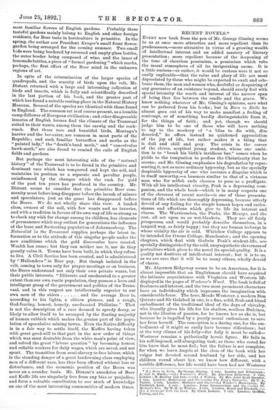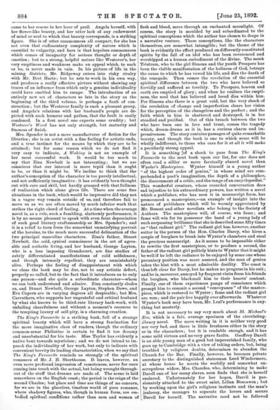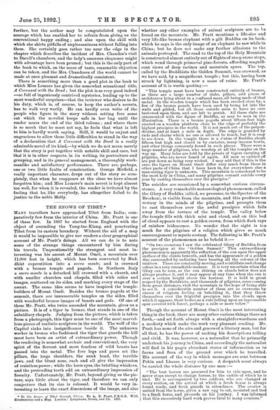RECENT NOVELS.*
EVERY new book from the pen of Mr. George Gissing seems to us at once more attractive and more repellent than its predecessors,—more attractive in virtue of a growing wealth of intellectual interest and an added mastery of literary presentation ; more repellent because of the deepening of the tone of cheerless pessimism, a pessimism which robs the moral atmosphere of all its invigorating ozone. It is a little-curious—or rather, it would be curious were it not so easily explicable—that the value and glory of life are most depreciated by those who might be expected to exalt and cele- brate them, the men and women who, doubtful or despairing of any guarantee of an existence beyond, should surely feel with special intensity the worth and interest of the narrow span of being that lies between the cradle and the grave. We know nothing whatever of Mr. Gissing's opinions, save what can be gathered from his books ; but in Born in Exile he almost goes out of his way to make manifest a feeling of contempt, or of something hardly distinguishable from it, for the things of faith ; and yet, though we should judge him to be one of those who will have nothing to say to the mockery of " a bliss to die with, dim descried," he offers instead no quickened appreciation of the joy of life, but rather makes it a thing that is dull and chill and grey. The crisis in the career of the clever, sceptical young student, whose one ambi- tion is to " break his birth's invidious bar," comes when he yields to the temptation to profess the Christianity that he scorns; and Mr. Gissing emphasises his degradation by repre- senting it, not as mere ordinary hypocrisy, but as the specially despicable hypocrisy of one who assumes a disguise which is in itself unworthy,—a baseness similar to that of a virtuous man who for selfish ends chooses to pose as a profligate. With all his intellectual vivacity, Peak is a depressing com- panion, and the whole book—which is in many respects one of the cleverest of recent novels—is one of those presenta- tions of life which are thoroughly depressing, because utterly devoid of any feeling for the simple human hopes and enthu- siasms and affections which give to life its interest and charm. The Warricombes, the Peaks, the Moxeys, and the rest, all act upon us as wet-blankets. They are all fairly prosperous, and would probably describe themselves, in a languid way, as fairly happy; but they are human icebergs in whose vicinity the air is cold. Whitelaw College appears to be intended for Owens College, Manchester ; and the opening chapters, which deal with Godwin Peak's student-life, are specially distinguished by the cold, unsympathetic cleverness of portraiture which gives to the novel its special quality. It is a quality not destitute of intellectual interest ; but it is to us, as we are sure that it will be to many others, wholly devoid of charm.
Mr. Algernon Ridgeway seems to be an American, for it is almost impossible that an Englishman should have acquired the intimate acquaintance with Virginian and Western life displayed in the pages of Westover's Ward. The book is fall of freshness and interest, and the two most prominent characters have an individuality which impresses the imagination with considerable force. The hero, Meade Westover, a modern Don Quixote and Sir Galahad in one, is a fine, solid, flesh-and-blood embodiment of the traditional ideal of the days of chivalry, who literally gives his life for his shallow, soulless Dulcinea, not in the illusion of passion, for he knows her as she is, but because he is impelled by a purely moral enthusiasm to save her from herself. The conception is a daring one, for the em- bodiment of it might so easily have become ridiculous ; but at the very climax of his folly—for folly it must be called— Westover remains a pathetically heroic figure. He fails in his self-imposed, self-abnegating task, as those who cared for him knew that he must fail; but the failure is not complete, for when we leave Angela at the close of the book with her vulgar but devoted second husband by her side, and her children round about her, we know how different, with a terrible difference, her life would have been had not Westover
• (1.) Born in Exile. By George Gissing. 3 vols. London and Edinburgh : A. and 0. Black.—(2.) Westover's Ward. By Algernon Ridgeway. S vole. London : H. Bentley and Son.—(3.) A Waking. By Mrs. John Kent Spender. vols. London: Hutchinson and Oo.—(4.) The King's Favourite. By II. A. Taylor. 2 vols. London: Methuen and 0o.—(5.) Wynter's Masterpiece. By Frederick Leal. 2 vols. London : Swan Sonnenschein and 00.—(6.) St. Michael's Eve. By W. H. de Winton. 2 vols. London : Hurst and Blaokett.— (7.) A Covenant with the Dead. By Clara Lemore. 3 vols. London: Griffith, Farran, and Co. come to her rescue in her hour of peril. Angela herself, with her flower-like beauty, and her utter lack of any endowment of mind or soul to which that beauty corresponds, is a striking figure. She is of utter commonness all compact, for she has not even that rudimentary complexity of nature which is essential to vulgarity, and hers is that hopeless commonness which comes of incapacity for serious thought or depth of emotion ; but to a strong, helpful nature like Westover's, her very emptiness and weakness make an appeal which, to such as he, is never made in vain. In his picture of life in the mining districts, Mr. Ridgeway enters into risky rivalry with Mr. Bret Harte ; but he sets to work in his own way, and produces a really effective picture without showing any traces of an influence from which only a genuine individuality could have enabled him to escape. The introduction of an entirely new set of characters so late in the story as the beginning of the third volume, is perhaps a fault of con- struction ; but the Westover family is such a pleasant group, and Angela's relations with her husband's people are de- picted with such humour and pathos, that the fault is easily condoned. In a first novel one expects some crudity ; but Westover's Ward has not only strength, but maturity and fineness of finish.
Mrs. Spender is not a mere manufacturer of fiction for the libraries ; she is an artist with a fine feeling for artistic ends, and a true instinct for the means by which they are to be attained; but for some reason which we do not find it very easy to indicate, A Waking is not an example of her most successful work. It would be too much to say that Zina Newbolt is not interesting ; but we are conscious that our interest is more tepid than it ought to be, or than it might be. We incline to think that the author's conception of the character is too purely intellectual, and not sufficiently imaginative : it has evidently been thought out with care and skill, but hardly grasped with that fullness of realisation which alone gives life. There are some fine situations in the book, which would be impressive did they not in a vague way remain outside of us, and therefore fail to move us as we are often moved by much inferior work that strikes the right chord of feeling. At a time when the average novel is, as a rule, such a fumbling, slatternly performance, it is by no means pleasant to speak with even faint depreciation of such good literary craftsmanship as Mrs. Spender's ; and it is a relief to turn from the somewhat unsatisfying portrait of the heroine, to the much more successful delineation of the two principal masculine characters. Zina's father, Stuart Newbolt, the cold, cynical connoisseur in the art of agree- able and aesthetic living, and her husband, George Layton, who is a less imposing Grandcourt, are fine studies of subtly differentiated manifestations of cold selfishness; and though intensely repellent, they are unmistakably alive. Perhaps the feeling of disappointment with which we close the book may be due, not to any artistic defect, properly so called, but to the fact that it introduces us to only one person—and she quite a subordinate character—whom we can both understand and admire. Zina constantly eludes us, and Stuart Newbolt, George Layton, Stephen Dewe, and Eva Capern are in varying degrees all despicable; but Mrs. Carruthers, who supports her ungrateful and critical husband by what she knows to be third-rate literary hack-work, with unfailing cheerfulness and without a moment's recourse to the tempting luxury of self-pity, is a charming creation.
The King's Favourite is a striking book, full of a strange spiritual beauty which will have a strong fascination for the more imaginative class of readers, though the ordinary common-sense Philistine is certain to find it too dreamy and unsubstantial for his taste. Miss Taylor has evidently a native bent towards mysticism ; and we do not intend to im- peach the individuality of her work, but only to indicate with convenient brevity its leading characteristics, when we say that The King's Favourite reminds us strongly of the spiritual romances of Mr. J. H. Sborthouse. It leaves, however, an even more profound impression of remoteness, never for once coming into touch with the actual, but being wrought through- out of the stuff that dreams are made of. The scene is laid somewhere on the English coast; the period is the reign of the second Charles ; but place and time are things of no concern, for we are in the placeless, timeless world of liure romance, where shadowy figures, who, though in human form, are em- bodied spiritual conditions rather than men and women of
flesh and blood, move through an enchanted moonlight. Of course, the story is moulded by and subordinated to the spiritual conceptions which the author has chosen to drape in a narrative vesture. These conceptions, like the characters themselves, are somewhat intangible ; but the theme of the book is evidently the effect produced on differently constituted spirits by the fall of an idol who has been reverenced and worshipped as a human embodiment of the divine. The monk Tristram, who to the girl Simona and the youth Prospero has been the visible manifestation of the holiness of God, betrays the cause to which he has vowed his life, and dies the death of the renegade. Then comes the revelation of the essential spiritual difference between the two who have believed so fervidly and suffered so terribly. To Prospero, heaven and earth are emptied of glory ; and when he realises the empti- ness, the soul that has believed and loved dies within him. For Simona also there is a great void, but the very shock of the revelation of change and imperfection clears her vision for the perception of the changeless and the perfect ; and the faith which in him is shattered and destroyed, is in her steadied and purified. Out of this breach between the two who have been one in love and trust, comes the tragedy which, dream-drama as it is, has a curious charm and im- pressiveness. The story contains passages of quite remarkable beauty, and though the book is one to which some will be wholly indifferent, to those who care for it at all it will make a peculiarly strong appeal.
It is something Psof a shock to pass from The King's Favourite to the next book upon our list, for one does not often read a sillier or more farcically absurd novel than Wynter's Masterpiece. Wynter himself is a young author " of the highest order of genius," in whose mind are com- prehended a poet's imagination, the depth of a philosopher, the discernment of a critic, and the range of an encyclopaedist " This wonderful creature, whose recorded conversation does sad injustice to his extraordinary powers, has written a novel which a publisher, who has seen it in manuscript form, has pronounced a masterpiece,—an example of insight into the nature of publishers which will be warmly appreciated by Mr. Besant and other novelists who belong to the Society of Authors. The masterpiece will, of course, win fame ; and fame will win for its possessor the hand of a young lady of such surpassing brilliance that she is described some fifty times as "that radiant girl." The radiant girl has, however, another suitor in the person of the Hon. Charles Darcy, who hires a couple of burglars to break into Wynter's chambers and steal the precious manuscript. As it seems to be impossible either to rewrite the first masterpiece, or to produce a second, the father of the radiant girl politely hints to Wynter that it might be well if he left the radiance to be enjoyed by some one whose pecuniary position was more assured, and the man of genius takes the hint with a most admirable docility. The coast is thus left clear for Darcy, but he makes no progress in his suit; and he is, moreover, annoyed by frequent visits from his friends the burglars, who blackmail him to their hearts' content. Finally, one of them experiences pangs of conscience which prompt him to commit a second "conveyance" of the master- piece, which is restored to Wynter ; fame and the radiant girl are won; and the pair live happily ever afterwards. Whatever Wynter's book may have been, Mr. Leal's performance is any- thing but masterly.
It is not necessary to say very much about St. Michael's Eve, which is a fair, average specimen of the circulating- library novel. The mere writing in it is neither very good nor very bad, and there is little freshness either in the story or in the characters; but it is readable enough, and it has some mild virtues and no very grave faults. Geoffrey Darell is an able young man of a good but impoverished family, who goes up to Cambridge with a view of taking orders, but, being troubled by religious doubts, determines to abandon the Church for the Bar. Finally, however, he becomes private secretary to the distinguished statesman Lord Windermere,
at whose house he meets the worldly and somewhat un- scrupulous widow, Mrs. Chandos, who, determining to make Darell one of her many slaves, soon finds that she is herself enslaved. Unfortunately for her hopes, Darell is pas- sionately attached to the sweet saint, Lilian Boscawen ; but by working upon the girl's religious instincts and the man's jealousy, she manages to separate the lovers and secure Darell for herself. The narrative need not be followed further, but the author may be congratulated upon the courage which has enabled her to refrain from giving us the conventional happy ending ; and also upon the skill with which she skirts pitfalls of unpleasantness without falling into them. She certainly goes rather too near the edge in the chapter which describes the incident of Mrs. Chandos's visit to Darell's chambers, and the lady's amorous eloquence might with advantage have been pruned ; but this is the only part of the book to which, on the score of taste, reasonable objection can be taken, and the Mrs. Chandoses of the world cannot be made at once pleasant and dramatically consistent.
There is something more than a good plot in the book to which Miss Lemore has given the somewhat sensational title, A Covenant with the Dead ; but the plot is so very good indeed —so full of ingeniously contrived mysteries, leading up to the most wonderful surprises—that the reviewer who desires to do his duty, which is, of course, to keep the author's secrets, has to walk very warily. He can hardly even write of the people who figure in the story without setting free some cat which the novelist keeps safe in her bag until the reader nears the end of the third volume ; and where there is so much that he must not say, he feels that what is left to him is hardly worth saying. Still, it would be unjust and ungracious to allow these little difficulties to stand in the way of a declaration that A Covenant with the Dead is a really admirable novel of its kind,—by which we do not mean merely that the story is put together with notable skill and care, but that it is in other respects, in its writing, its portraiture and grouping, and in its general management, a thoroughly work- manlike and satisfactory performance. There are, perhaps, one or two little faults of construction. George Mirfield, a really important character, drops out of the story so com- pletely, that when he reappears at the close we have almost forgotten him ; and Miss Lemore's main secret is kept almost too well, for when it is revealed, the reader is irritated by the feeling that he, like everybody, has altogether failed to do justice to the noble Molly.




































 Previous page
Previous page